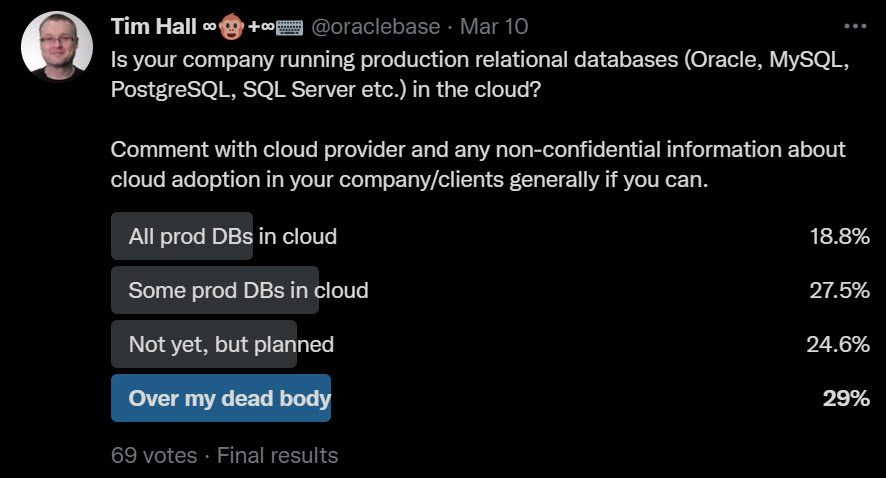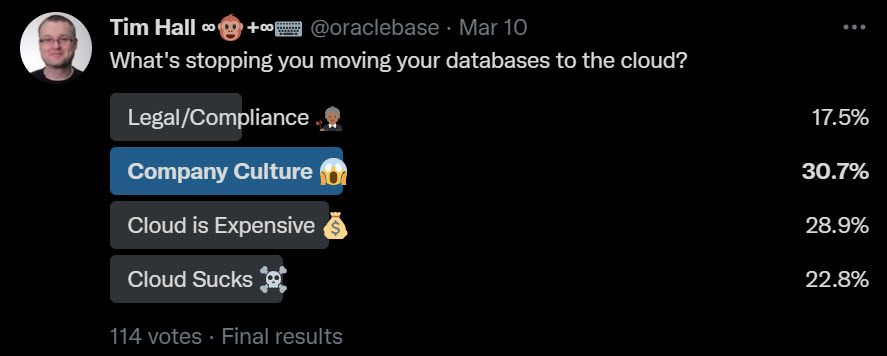
It can be quite difficult to know if your impression of technology usage is skewed. Your opinion is probably going to depend on a number of factors including what you read, who you follow, and the type of company you work for. For this reason I asked some questions on Twitter the other day, just to gauge the response.
Let me start by saying, this is a small sample size, and most of my followers come from the Oracle community, including a number of Oracle staff. This may skew the results compared to other database engines, and technology stacks. I’m commenting on the results as if this were a representative sample, but you can decide if think it is…
So this was the first question I asked.

We can see there was a fairly even spread of answers.
- All prod DBs in cloud: A response of nearly 19% picking this option kind-of surprised me. I speak to a lot of people, and there always seems to be something they’ve got that doesn’t fit well in the cloud for them. Having this many people saying they’ve managed to make everything fit is interesting.
- Some prod DBs in cloud: I expected this response to be high and with over 27% it was. When we add this to the previous category, we can see that over 46% of companies have got some or all of their production relational databases in the cloud. That’s a lot.
- Not yet, but planned: At over 24%, when added to the previous categories, it would seem that over 70% of companies see some perceived value in running their databases in the cloud. Making that initial step can be difficult. I would suggest people try with a greenfield project, so they can test the water.
- Over my dead body: At 29%, this is a lot of people that have no intention of moving their databases to the cloud at this moment in time. We might get some answers about why from the next question.
This was my second question.

Once again, we get a fairly even spread of responses.
- Legal/Compliance: Over 17% of respondents have hit this brick wall. Depending on your industry and your country, cloud may not be an option for you yet. Cloud providers are constantly opening up data centres around the world, but there are still countries and regions that are not well represented. Added to that, some organisations can’t use public cloud. Most cloud providers have special regions for government or defence systems, but they tend to be focused in certain geographical regions. This is a show stopper, until the appropriate services become available, or some hybrid solution becomes acceptable.
- Company Culture: At over 30%, this is a road block to lots of things. Any sort of technology disruption involves a change in company culture, and that’s one of the hardest things to achieve. It’s very hard to push this message from the bottom up. Ultimately it needs senior management who understand the need for change and *really* want to make that change. I say *really* because I get the feeling most management like to talk the talk, but very few can walk the walk.
- Cloud is Expensive: At nearly 29%, this is an interesting one. The answer to the question, “is cloud more expensive?”, is yes and no. 🙂 If you are only looking at headline figures for services, then it can seem quite expensive, but the cloud gives us a number of ways to reduce costs. Reserved instances reduce the cost of compute power. Selecting the correct shape and tier of the service can change costs a lot. Spinning down non-production services when they are not used, and down-scaling production services during off-peak hours can save a lot of money, and these are not things that necessarily result in a saving on-prem. I also get the impression many companies don’t work out their total cost of ownership (TCO) properly. They forget that their on-prem kit requires space, power, lighting, cooling, networking, staffing etc. When they check the price of a service on the cloud, it includes all that, but if you don’t take that into consideration, you are not making a fair comparison. Some things will definitely be cheaper on the cloud. Some things, not so much. 🙂
- Cloud Sucks: At nearly 23%, this is a big chunk of people. It’s hard to know if they have valid reasons for this sentiment or not. Let’s take it on face value and assume they do. If this were a reflection of the whole industry, it’s going to be interesting to see how these people will be won over by the cloud providers.
The comments resulted in a few interesting things. I’ve responded to some of them here.
- “Lack of cloud skills.” We all have to start somewhere. I would suggest starting with small proof of concept (POC) projects to test the water.
- “Unreasonable Oracle licencing restrictions.” In case you don’t know, the core factor doesn’t apply to clouds other than Oracle Cloud, which makes Oracle licensing more expensive on non-Oracle clouds. Of course, everything can be negotiated.
- “Lack of availability of Cloud experts to assist/advise.” I’m sure there are lots of people that claim they would be able to help, but how many with a proven track record is questionable. 🙂
- “We have a massive legacy estate to consider.” Certainly, not everything is easy to move the the cloud, and the bigger your estate, the more daunting it is. I’m sure most cloud providers would love to help. 🙂
- “Latency with fat client applications.” I had this conversation myself when discussing moving some of our SQL Server databases to Azure. It can be a problem!
- “Seasonal businesses with uncertain money flow may not able to meet the deadlines for subscription payments.” Scaling services correctly could help with this. Scale down services during low periods, and scale up during high periods.
- “The prime fear is being pulled off from the grid. Undependable internet connections.” Sure. Not every place has dependable networking.
- “Bandwidth requirements & limited customization possibilities.” Ingress and egress costs vary with cloud providers. It may be intelligent design of your processes can reduce the amount of data being pushed outside the cloud provider. The cloud is very customisable, so I’m not sure what the issue is here, but I’m sure there are some things that will be problematic to some people.
Overall I think this was an interesting exercise. Even five years ago I would have expected the responses to skew more in favour of on-prem. Barring some huge change in mindset, I would expect the answers to be even more in favour of cloud in another 5 years.
Regardless of your stance, it seems clear that familiarity with cloud services should be on your radar, if it’s not already. Your current company may not be fans of the cloud, but if you change jobs the cloud may be a high priority for your new company.
Cheers
Tim…
PS. I’ve been running my website on AWS since 2016 . I started to write about some services on AWS and Azure in 2015. I’ve been playing with Oracle Cloud since its inception in 2016 (I think). Despite all this, I consider myself a dabbler, rather than an expert.